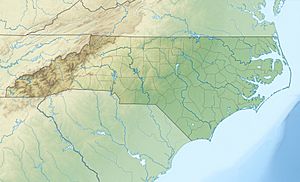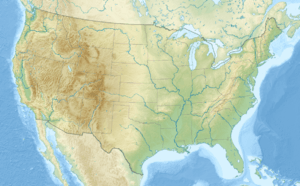Hewletts Creek facts for kids
Quick facts for kids Hewletts Creek |
|
|---|---|
|
Location of Hewletts Creek mouth
|
|
| Other name(s) | Tributary to Intracoastal Waterway |
| Country | United States |
| State | North Carolina |
| County | New Hanover County |
| Physical characteristics | |
| Main source | Cape Fear River divide Wilmington, North Carolina 32 ft (9.8 m) 34°10′56″N 077°53′52″W / 34.18222°N 77.89778°W |
| River mouth | Intracoastal Waterway Masonboro, North Carolina 0 ft (0 m) 34°10′53″N 077°50′07″W / 34.18139°N 77.83528°W |
| Length | 4.69 mi (7.55 km) |
| Basin features | |
| Progression | east and southeast |
| River system | Atlantic Ocean |
| Basin size | 11.09 square miles (28.7 km2) |
| Tributaries |
|
| Bridges | Robert E. Lee Drive, NC 132, Holly Tree Road, Cascade Road, Pine Grove Drive |
Hewletts Creek is a small stream located in New Hanover County, North Carolina, in the United States. It's quite special because it's the only stream with this exact name in the entire country!
This creek got its name from an early family of settlers who lived in the area. It plays an important role in the local environment.
Where Hewletts Creek Flows
Hewletts Creek begins in the Wilmington, North Carolina area. It starts near the Cape Fear River divide, which is like a high point that separates different water flow directions.
From there, the creek flows mostly towards the east and then the southeast. Its journey ends when it reaches the Intracoastal Waterway in Masonboro, North Carolina. The Intracoastal Waterway is a long channel that runs along the Atlantic and Gulf coasts of the United States.
The Hewletts Creek Watershed
A watershed is an area of land where all the water drains into a common point, like a river, lake, or ocean. The Hewletts Creek watershed covers about 11 square miles. This means all the rain that falls on this 11-square-mile area eventually flows into Hewletts Creek.
On average, the area around Hewletts Creek gets about 57.9 inches of rain each year. About 11% of the land in this watershed is covered by forests. These forests are important because they help filter the water and provide homes for many plants and animals.



